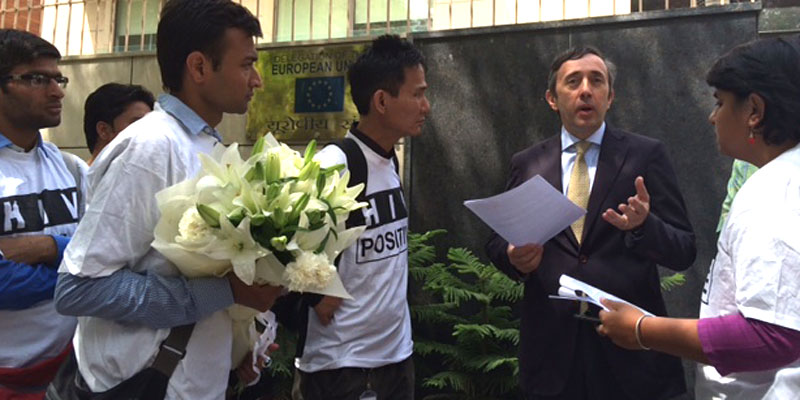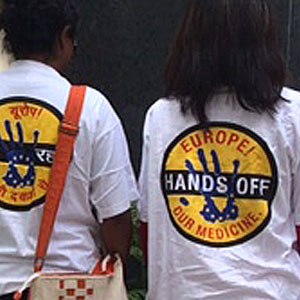EU urged to stop threatening access to affordable medicines, as European Union and India resume negotiations
Today at the 13th EU-India summit, a resumption in European Union and India Free Trade Agreement negotiations is expected to be announced. To coincide with this, people living with HIV highlight their concerns about access to affordable medicines by handing over a letter to the European Commissioner for Trade, via the EU offices in Delhi.
The International Treatment Preparedness Coalition – South Asia and the Delhi Network of Positive People make the protest in a bid to secure universal access to treatment for all people living with HIV in India, and throughout the world. Acknowledging the recent tragedies in Europe, the activists hand over a bunch of white lilies to express their sincere condolences at the loss of life following the terrorist attacks in Paris and Brussels.
The letter raises two key concerns regarding the status of negotiations on Intellectual Property (IP) and investment provisions. The EU-India Free Trade Agreement negotiations have been going on since 2007. From the outset, the European Commission (EC) has pushed to include provisions that would undermine India’s ability to produce affordable medicines on which millions of people in developing countries rely. In 2011, certain provisions damaging to access to medicines such as patent term extensions and data exclusivity have been removed by EU negotiators or rejected by the Indian Department of Industrial Policy and Promotion (DIPP) from the proposed text. The letter, urges the EC to stand by its position and promises made publicly to people living with HIV, and not to bring back these discussions with the Indian negotiators and ministers. The letter calls on EC to take harmful intellectual property provisions out of the trade deal, including text around intellectual property enforcement and investment provisions (PDF)
In the past, the European Commission has consistently demanded that India keep the process and content of the Free Trade Agreement negotiations secret. The campaigners urge the Commission to apply its new policies of greater transparency to all existing proposed negotiating texts related to the EU-India Free Trade Agreement.
Finally, the campaigners note that the TRIPS agreement – which has bound India to introduce a product patent system in 2005 – has already begun to curtail the country’s ability to produce low-cost generic versions of newer HIV, hepatitis and cancer medicines. They urge the European Union not to push India to accept TRIPS Plus IP provisions in the trade negotiations, as these threaten India’s ability to continue producing and supplying life saving medicines to governments, and millions of people across the world.

